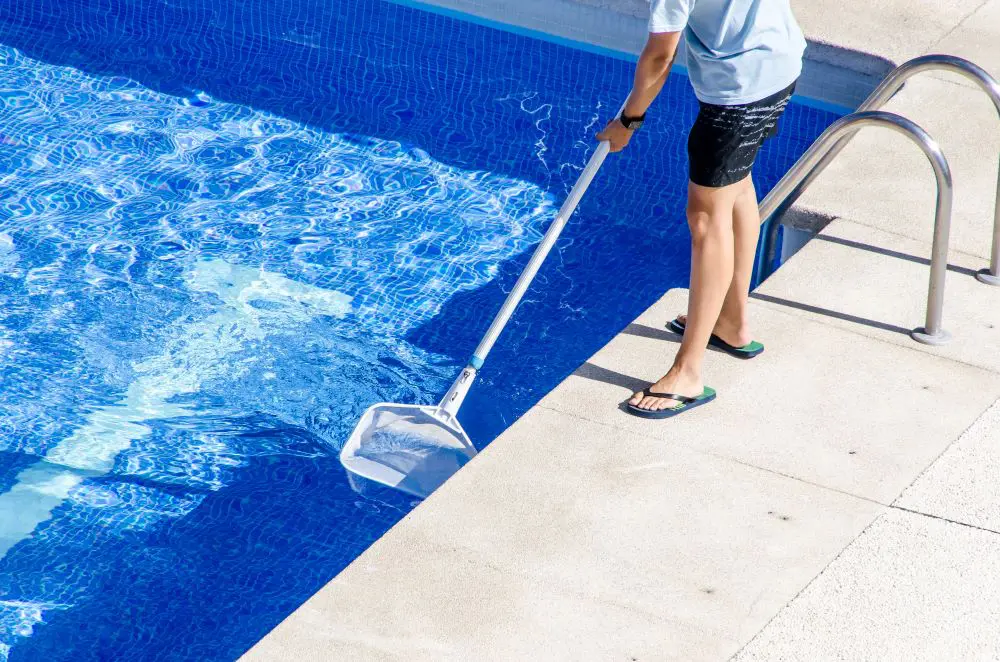Maintaining your pool water isn’t difficult, but it does require keeping up with a few basic requirements. It can help to make a checklist of tasks that you can keep near your pool to ensure everyone is doing their part.
Knowing what tasks should be on that checklist to keep your water safe and clean is an essential first step.
Keeping the Water Clean Is Essential Pool Maintenance
You can protect your pool water and swimmers by performing a basic skimming of the water’s surface. Use a net to catch debris, such as tree branches and leaves, and remove litter from the water.
This will prevent those items from clogging the filtration system, forming a film on the water’s surface, or sinking to accumulate on the pool’s floor.
As you clean debris from the pool water, take the time to clean the drains and strainer baskets. Debris is likely to get caught up in the strainers, inhibiting the functioning of the filtration system. If you don’t clean the strainers regularly, your pool water won’t get properly filtered.
Keep an Eye on the Water Level
Splashing, evaporation, and other factors can cause your pool’s water level to drop gradually. While this might not seem like a big concern, it can lead to costly repairs.
If there’s insufficient water in the pool, the skimmer will draw in more air than water. This will cause the pool pump’s motor to burn out. Topping off your water from time to time will help you correct this problem.
Another reason it’s important to keep an eye on the water level is to catch the signs of a leak. Some water loss is normal, but consistently losing water suggests there’s a leak somewhere in the pool or filtration system. Repairing the leak will make your overall pool maintenance more effective.
Know When to Clean Your Filter
A small amount of debris in the pool filter will help it function more efficiently by increasing its ability to trap more debris. The best time to clean the pool filter is when there’s a flow difference of 10 to 15 pounds per square inch between the pressure gauge and flow meter.
Run Your Pump Every Day
Your daily pool maintenance routine should include running the pool pump for a few hours, one to two times per day. This will help you make sure the circulation system continues to operate efficiently. If there’s a problem or malfunction, you’ll identify it sooner through daily operation of the circulation system.
Avoid running the pool pump for more than a few hours each day. Letting the system run for 24 hours or longer will increase stress on the pump. In addition to faster wear and tear, continuous operation can cause the pump’s motor to burn out.
Know When to Drain Your Pool
You’ll rarely need to completely drain your swimming pool, but this is something your pool maintenance service may request from time to time. This step is typically required for repairs. In this case, make sure your pool pump is off before draining the water.
Refill your pool right away or as soon as possible. The surrounding soil will add pressure to an empty pool. When this occurs, the pool might pop up out of the ground or suffer structural damage.
Check the pH Balance and Chemical Composition
If you use your swimming pool on a daily basis, you should also test the water just as regularly. If you use the pool infrequently, it’s still a good idea to test the water once per week. This will ensure you maintain a good chemical and pH balance consistently.
The pH balance in your pool water should stay between 7.2 and 7.6 regardless of how frequently you use your pool. Additionally, maintain a chlorine level of 1 to 3 parts per million (PPM). If needed, add chemicals in the evening when the temperature is lower. Adding chemicals under the heat of the sun can cause unwanted reactions.
Invest in Cleaning Equipment
It can help to invest in an automated pool vacuum. There are several types on the market, and using one of them to keep pool water clean will enhance the filtration process. You’ll find that you can add fewer chemicals to the water if you keep it cleaner.
For a plaster-lined pool, use a stiff-bristled brush to scrub algae and sediment off the pool walls. If you have tile, vinyl, or fiberglass surfaces, use a soft-bristled brush.
We’ll Help You Maintain Clean Pool Water
Calm Waters provides the pool maintenance services you need to ensure your pool water is always clean and safe. Whether you need an inspection, maintenance, or repairs, you can rely on our extensively trained and experienced technicians to provide high-quality pool care service. Contact us today to schedule service in Florida.





